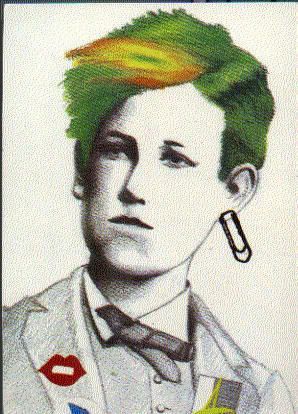
BOB NEUWIRTH
Look Up
Watermelon Records
WMCD 1050
When the secret history comes to be written Bobby Neuwirth is going to feature prominently. He floats through the various scenes that haunt the dreams of us rock obsessives. The cars, trains and hotel rooms of "Don't Look Back", the spaces of the Factory, the Chelsea Hotel of the early seventies, the psychodramas of Rolling Thunder. For encouraging and sustaining Uncle Bobby and Patti Smith alone he deserves our heartfelt thanks.
What is even less known about him is his music. There are good reasons for that. Neuwirth's first love is his painting, singing seemed to have been a hobby. Up till 1989 my sole acquaintance with his performing talent was two duets; 'Long Black Veil' with Baez from "Don't Look Back" and the raucous 'Vincent Van Gogh' with Dylan that they bashed out at some of the Rolling Thunder shows. Then in the space of eighteen months came two albums "Back To The Front" and "99 Monkeys". Collections of seemingly effortless songs that stayed in the memory and confirmed T-Bone Burnett's contention that "in many ways, he's the best pure songwriter of any of us". He also played a wonderful show at the Mean Fiddler Acoustic Room the night the Berlin Wall came down. And then pretty much silence.
So it was well out of the blue that "Look Up" appeared and what a glorious surprise it was. Neuwirth describes the album as a field trip, visiting friends and making music. What friends! What music!. Its variously recorded in places such as Austin, Lubbock, Santa Monica and Detroit. The pals include Peter Case, Butch Hancock, Chuck Prophet and Patti Smith. There is no let-up, the sixteen songs are all top notch and show Neuwirth as the consummate chameleon artist sliding between styles and genres.
Neuwirth's is essentially a country voice, rich, compassionate, lived in, akin to Willie Nelson's but less the stylist and more the storyteller or the messenger. With few exceptions these are songs of regret, of loss, and of starting over aware of the depredations of time and living. They are not without the gnomic aphorism of the "anything you really want to keep/first you gotta learn to give it away" variety. Picking highlights is difficult.'I Don't Think Of Her', with Bernie Leadon and Mickey Raphael's poignant harmonica is a close cousin to Dylan's 'Most Of The Time', and as with that song every nuance tells you don't believe a word. 'What's Our Love Comin' To', co-written with Billy Swan, verses traded with Rosie Flores, lead guitar from Chuck Prophet, is as good a piece of rocking country as you will hear and makes an interesting counterpoint to 'Nashville', a lament for the disappearance of "my music" from Music City, with aching pedal steel from Sandy Bull.
There are three co-compositions with Peter Case. Bobby Charles' 'Save Me Jesus' with an ensemble including Mark Olsen and Victoria Williams. Long time compadres David Mansfield and Steve Soles keep reappearing throughout. And then there's Patti, and here we need to take a diversion.
Patti Smith's return to the stage, to work, has been one of the most exciting developments of this last year. There has obviously been great encouragement from people like Neuwirth and Dylan, but it must be likely that this return emerged out of the coming to terms with the loss of husband Fred and brother Todd. 'Just Like You', recorded at her Detroit home, implies just that. Over a simple guitar strum Patti half recites, half sings, a testament. She has been low and fearful, despairing, "stumbling a path, so hard to be/littered with the heart's debris" but life, the sun, has called her back. "I woke up and so many fears/had died and dried/and in their place/ a crazy kind of hope embraced/ chased the tears across my face/ Work to be done, worlds to parade/ debts to be paid, debts to be paid/ the hard road glitters/ are you glad to go-/'fraid so, 'fraid so".
So we have to thank Bobby Neuwirth again for his generosity. But let's not lose sight of the fact that this is his album. It's a great return and we can but hope that its not just a slight one.
(from BoB #46 Aug 1996)


0 Comments:
Post a Comment
<< Home